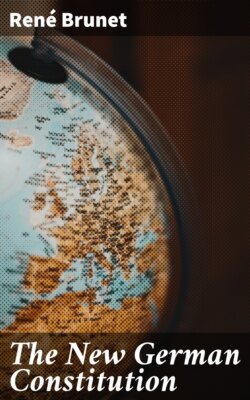Читать книгу The New German Constitution - René Brunet - Страница 16
На сайте Литреса книга снята с продажи.
SECTION I
TERRITORIAL STATUS OF THE STATES
ОглавлениеTable of Contents
Territory is one of the essential elements of a state. In a confederated state the central government cannot force on the member states changes or exchanges of territory, fusions or parceling of their respective holdings. Such was in principle the régime prevailing in the old German Empire. The historic composition of the individual states as they were when their princes signed the federal pact in 1871 was guaranteed, and the territories of individual states were protected by the Constitution in the geographic integrity they had when they entered the Empire.
The Constitution of Weimar on the other hand put forward the principle of the mobility of frontiers. But it was not until after the most violent and passionate discussions that this was adopted, and not without modifications that peculiarly limited its operation. For, what was foremost in the deliberations and constantly dominated them was neither more nor less than the question of the dismemberment of Prussia. The cardinal consideration was this: legally the majority of the problems of organization that the Constitution had to solve would depend for their solution according to whether Prussia would or would not retain its territorial integrity. But the political problem was also grave. Prussia remaining as such, would it not exercise again its former hegemony over Germany with all the attendant dangers to the domestic and foreign policies of the Reich, dangers of an obstinate reaction at home and of an insatiable pan-Germanism abroad?
